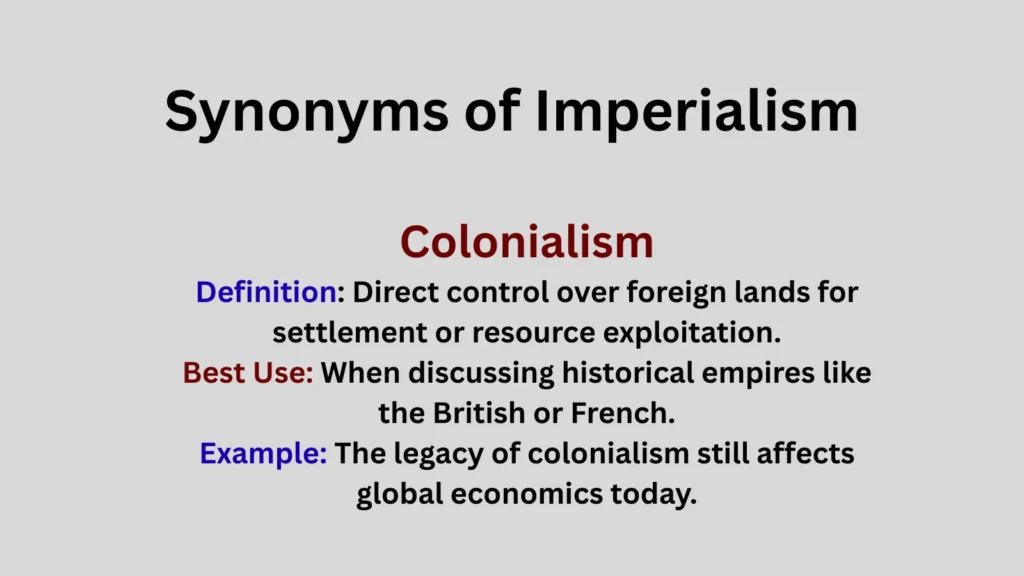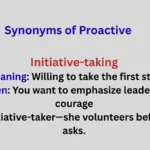When you hear the term imperialism, what flashes through your mind? Grand empires marching across maps? Conquest, colonization, domination, or the quiet grip of political control? Imperialism is far more layered than these familiar images. The synonyms of imperialism uncover hidden shades of power, influence, and subtle dominance that often escape notice. At its core, imperialism is the deliberate policy or practice of extending a nation’s reach over other lands and peoples—whether through brute force, calculated diplomacy, or economic pressure.”
In this article, we’ll explore 30 carefully selected synonyms of imperialism, each carrying its own unique shade of meaning. For every synonym, you’ll find a clear explanation along with an example sentence to show how it’s used in context.
This detailed approach will help you grasp the subtle differences between these terms and deepen your understanding of imperialism’s complex nature. Let’s dive in and uncover the many faces of power and influence behind these words.
What Does Imperialism Really Mean?
Imperialism is the policy by which a country increases its power by gaining control over other areas of the world. This can be through military conquest, political manipulation, economic pressure, or cultural dominance.
It often has a negative connotation—especially when linked to colonialism, exploitation, or the suppression of native cultures. But in some historical or strategic discussions, it may be described more neutrally as an expression of geopolitical influence.
Synonyms of Imperialism and When to Use Them
1. Colonialism
Definition: Direct control over foreign lands for settlement or resource exploitation.
Best Use: When discussing historical empires like the British or French.
Example: The legacy of colonialism still affects global economics today.
2. Expansionism
Definition: A policy of expanding a nation’s territory or influence.
Best Use: More neutral than “imperialism,” often used in foreign policy analysis.
Example: The nation’s expansionism in the 19th century reshaped regional borders.
3. Hegemony
Definition: Dominance of one group over others, especially in cultural or political terms.
Best Use: Great for academic or geopolitical writing.
Example: The cultural hegemony of Western media is evident worldwide.
4. Colonization
Definition: Settling among and establishing control over indigenous people.
Best Use: Focus on the act of establishing colonies.
Example: Colonization displaced native populations across continents.
5. Dominance
Definition: The state of being in control.
Best Use: Broad term that works in many political or economic contexts.
Example: Their military dominance discouraged any rebellion.
6. Annexation
Definition: The formal act of adding territory to one’s domain.
Best Use: Legal or political discussions.
Example: The annexation of Crimea sparked international outrage.
7. Occupation
Definition: Holding and controlling a foreign land with military presence.
Best Use: Post-war contexts or temporary control.
Example: The occupation lasted for nearly a decade.
8. Colonial Rule
Definition: Governance by a colonial power.
Best Use: Historical references to structured control.
Example: Colonial rule imposed foreign systems on local communities.
9. Authoritarianism
Definition: Enforcing strict obedience at the expense of personal freedoms.
Best Use: When imperialism turns inward, toward domestic control.
Example: Authoritarianism replaced democracy in the region.
10. Power Projection
Definition: Extending military or political power beyond borders.
Best Use: Strategic/military contexts.
Example: Aircraft carriers are tools of power projection.
11. Sphere of Influence
Definition: A region dominated indirectly by another power.
Best Use: Cold War and diplomatic discussions.
Example: Eastern Europe was within the USSR’s sphere of influence.
12. Supremacy
Definition: State of being superior in status or power.
Best Use: Often racial or nationalistic in tone.
Example: White supremacy underpinned many imperial ideologies.
13. Subjugation
Definition: Forcing people or countries into submission.
Best Use: Emphasizes cruelty or force.
Example: Subjugation destroyed the cultural autonomy of the region.
14. Occupationism
Definition: Advocacy or practice of occupying territory.
Best Use: Rare, but used in academic texts.
Example: Occupationism shaped the early strategies of the empire.
15. Manifest Destiny
Definition: Belief in a divine right to expand territory.
Best Use: Historical U.S. expansion.
Example: Manifest Destiny justified westward expansion in the U.S.
16. Cultural Imperialism
Definition: Dominating other cultures via media, language, or products.
Best Use: Modern or post-colonial analysis.
Example: Hollywood’s reach reflects cultural imperialism.
17. Interventionism
Definition: Governmental interference in another country’s affairs.
Best Use: Foreign policy debates.
Example: Their interventionism often led to long-term instability.
18. Conquest
Definition: Gaining control through military force.
Best Use: War or empire-building contexts.
Example: The conquest brought riches and bloodshed.
19. Supplanting
Definition: Replacing one system or culture with another.
Best Use: Cultural or systemic dominance.
Example: Traditional laws were supplanted by colonial codes.
20. Control
Definition: Direct or indirect influence over decisions.
Best Use: General, everyday use.
Example: Their economic control shaped domestic policies.
21. Global Domination
Definition: Ambition to rule the world or large parts of it.
Best Use: Hyperbolic or ideological uses.
Example: Their sci-fi movie portrayed a quest for global domination.
22. Dependency
Definition: Creating reliance through economic or political means.
Best Use: Post-colonial economics.
Example: Aid programs sometimes foster dependency rather than growth.
23. Exploitation
Definition: Using others unfairly for benefit.
Best Use: Critical discussions of resource extraction or labor.
Example: Imperial powers thrived on the exploitation of local labor.
24. Militarism
Definition: Reliance on military force to achieve goals.
Best Use: Where force sustains imperialism.
Example: Militarism was at the heart of their colonial push.
25. Protectorate
Definition: A state controlled and protected by another.
Best Use: Colonial setups with nominal independence.
Example: The region functioned as a protectorate under British rule.
26. Neo-colonialism
Definition: Modern form of colonialism via economic or cultural control.
Best Use: Critical take on globalization.
Example: Neo-colonialism uses banks instead of armies.
27. Overreach
Definition: Extending power too far, often unsustainably.
Best Use: Warnings or criticisms.
Example: The empire’s overreach led to its downfall.
28. Feudalism
Definition: Hierarchical control through land and loyalty.
Best Use: Analogies to medieval systems or inequality.
Example: The company’s structure resembled digital feudalism.
29. Monopoly
Definition: Exclusive control over resources or markets.
Best Use: Economic power analogies.
Example: Tech monopolies echo imperialism in the digital age.
30. Supremacist Doctrine
Definition: Ideological belief in superiority over others.
Best Use: Philosophical or sociopolitical discussions.
Example: Supremacist doctrines fueled imperial justifications.
How to Choose the Right Synonym
Choosing the perfect word depends on tone, audience, and intent:
- For academic or neutral tone: Use hegemony, expansionism, or sphere of influence.
- To express criticism: Go with exploitation, subjugation, neo-colonialism, or supremacist doctrine.
- When discussing history, try colonialism, conquest, annexation, or manifest destiny.
- For modern analogies: Use monopoly, cultural imperialism, or dependency.
Also consider emotional weight. For instance, domination feels harsh, while influence sounds lighter. And occupation implies force, while protectorate implies control masked as support.
Conclusion:
Exploring the synonyms of imperialism, like occupationism, militarism, and exploitation, reveals the many faces of power and control throughout history. Each term highlights a distinct aspect of imperialism’s impact—whether through forceful occupation, military dominance, or economic abuse. Now, you have a complete insight into these synonyms and a great understanding of how to use each term effectively.
This knowledge will empower you to communicate with precision and depth when discussing complex topics of influence and authority.
Use these words wisely, and you’ll unlock a richer, more nuanced way to express the forces that shape our world.

I am Awa White, a passionate writer who loves crafting stories that touch hearts. I explore emotions and everyday life through my words. I strive to inspire and connect with readers through every piece I write.


